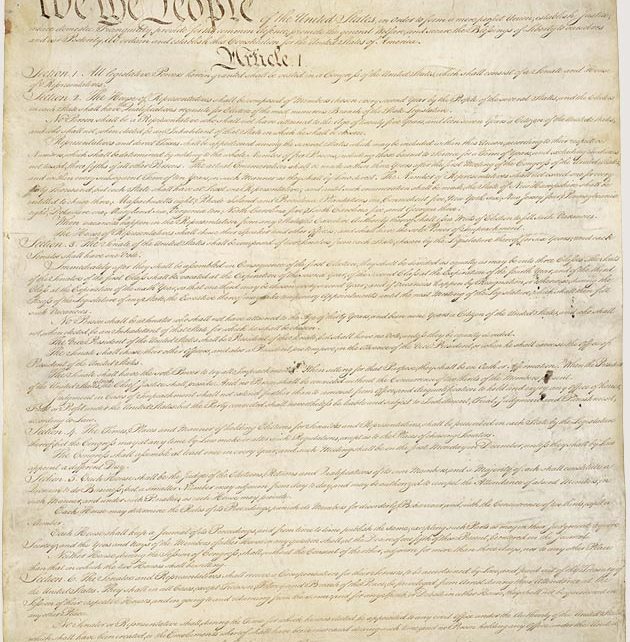
United States Constitution. (Photo: archives.gov)
Earmarks: A Monumentally Bad Idea
Earmarks can ‘grease’ legislation by buying-off the votes of individual members whose judgment would otherwise oppose a measure
By Tom McClintock, July 1, 2021 10:45 am
Ever since the Magna Carta, it has been a settled principle of good governance that the power that appropriates public funds should not be the same power that spends them. This principle is at the heart of our Constitution: the separation of powers.
Simply speaking, it is mother’s rule writ large. Mother has one slice of pie and two hungry sons. How does she cut the pie so that both brothers are satisfied? One slices, and the other chooses. One brother cannot abuse his powers precisely because of the powers accorded the other.
So it is with our Constitution. One brother makes law but cannot enforce it; the other enforces law but cannot make it. One brother appropriates money but cannot spend it; the other spends money but cannot appropriate it.
Imagine how differently mother’s rule would work if the same brother who sliced the pie also chose his piece.
Yet that is exactly the principle of congressional earmarks: choosing the same slice of pie you have just cut – or more precisely, spending the same money that you have just appropriated. Representatives have already dropped nearly 1,500 earmarks into the so-called infrastructure bill alone – costing $5.7 billion – now that a bipartisan spending frenzy has revived them.
This monumentally bad idea rests on two arguments. The first is that elected Members of Congress, and not unelected bureaucrats, should spend the people’s money. The problem, of course, is that representatives aren’t elected by all the people – only their own distinct constituencies. Representatives are supposed to have a bias toward their own districts. That is why Congress is designed to act collectively to make law and approve the appropriations to support that law. Only the executive answers to the entire nation and can resist the manifest excesses of a body controlled by 535 demanding constituencies and their parochial representatives. That is why appropriating money is a congressional function and spending it is an executive one.
The second argument is that earmarks can “grease” legislation by buying-off the votes of individual members whose judgment would otherwise oppose a measure. Add a few local projects for that member, and suddenly a bill he would never vote for on its merits becomes a local imperative overriding his sound judgment. Exactly how is that a good thing? And if earmarks are to be handed out as a reward for voting for legislation, members will prudently keep a list of earmarks handy as the demand to vote for any bill — whether or not they already plan to support it.
This is not a theoretical discussion. We have learned the hard way what comes from breaching the Constitution’s checks and balances.
The first problem is the corrupting nature of earmarks. When we place the power to appropriate and the power to spend in the same hands, we bypass the most important check against corruption.
A local company produces a product the Pentagon neither needs nor wants. What to do? It simply ingratiates itself with the local congressman and has him tell the Pentagon what it needs and who will provide it. Then it rewards him lavishly at election time and repeats. It should come as no surprise that many of the congressional scandals of the 1990’s and 2000’s arose from earmarks.
Second, earmarks bypass the normal process in which projects compete on their merits. Worthy projects don’t need earmarks if appropriations are spent by the executive branch according to well established competitive, open-bid procedures. Earmarks are only required to protect unworthy projects from merit-driven competition. And even if there is such a thing as a “good” earmark, the price invariably is log-rolling all the bad ones.
Third, earmarks harm the central tenet of federalism: that local projects should be financed by local communities, and federal expenditures reserved for the nation’s general welfare.
When a local government proposes an earmark, what is it saying? The project is so low on its priority list that it doesn’t dare spend its own taxpayers’ funds. But it is perfectly happy to have taxpayers in other communities foot the bill. The result is a grab bag of dubious projects that rob St. Petersburg to pay St. Paul — for projects that St. Petersburg does not benefit from and that St. Paul doesn’t deem worthy enough to spend its own funds on.
We’ve sung this old song many times before, and it has never ended well.
- Free Speech is the Cure and Not the Cause of Antisemitism - December 15, 2023
- Rep. Tom McClintock: Why I Oppose the Censure and Fine of Adam Schiff - June 14, 2023
- McClintock: Why I Support the Fiscal Responsibility Act - May 31, 2023





“Ever since the Magna Carta, it has been a settled principle of good governance that the power that appropriates public funds should not be the same power that spends them. This principle is at the heart of our Constitution: the separation of powers.”
The principles of the Magna Carta were eviscerated by the Protestant Reformation (aka, the Protestant REVOLUTION) in then Catholic Britain; a revolution of the RICH against the POOR. The same is occurring today with the Constitution being subverted in every way possible for one purpose – to benefit the RICH at the expense of the poor and middle class. History repeats itself: https://www.theburkean.ie/articles/2020/11/24/the-protestant-reformation-was-a-revolution-of-the-rich-against-the-poor. Just ask yourself this question: who among us has benefited MOST from the so-called pandemic? You or Jeff Bezos?
P.S. And which COUNTRY has benefited the most? Answer: CHINA
Jeffrey Gundlach @TruthGundlach
China GDP for the twelve months ended 3/31/21 was up 18.3%. US GDP for that same period was up 0.4%. US budget deficit has exploded over that period due to stimulus. Perhaps a bit overly simplistic, but what country exactly seems to benefit from US economic stimulus programs?